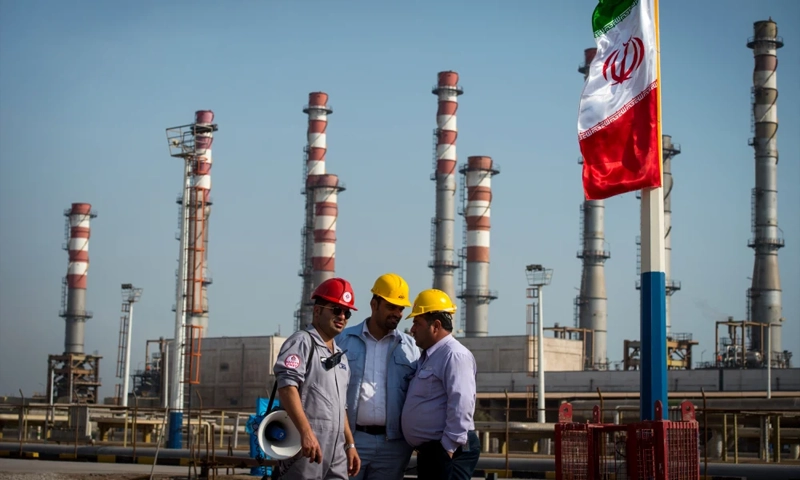- Web
- Yesterday
European powers move to reimpose UN sanctions on Iran

PARIS/TEHRAN: France, Britain and Germany on Thursday triggered a mechanism to reimpose UN sanctions on Iran for failing to comply with commitments over its nuclear programme.
Read more: China against European sanctions over Iran nuclear programme
The three countries notified the UN Security Council that they “believe Iran to be in significant non-performance of its commitments” under a 2015 nuclear deal, according to a letter seen by AFP.
In a related development, diplomatic sources said the UN Security Council will hold an emergency meeting on Iran behind closed doors Friday to discuss the European powers’.
The meeting will take place at 10:00 am (1400 GMT) at the request of France and Britain, the sources said.
WILL RESPOND APPROPRIATELY
Reacting to the latest development, Iran’s Foreign Minister Abbas Araghchi said Tehran would respond to a decision by France, Britain, and Germany.
“The Islamic Republic of Iran will respond appropriately to this illegal and unjustified action by the three European countries, in order to protect and guarantee its national rights and interests,” Araghchi told his French, British and German counterparts in a phone call, according to a statement from his ministry.
At the same time, Iran said the decision by European powers would undermine its cooperation with the UN’s nuclear watchdog.
“This decision by the three European countries will seriously undermine the ongoing process of interaction and cooperation between Iran and the International Atomic Energy Agency (IAEA),” the foreign ministry said in a statement, calling the move a “provocative and unnecessary escalation.”
US WANTS DIRECT TALKS
Meanwhile, US Secretary of State Marco Rubio said Washington sought direct talks with Iran on ending its nuclear programme.
Read more: Khamenei says Iran won’t bow down, US issue is ‘unsolvable’
Rubio welcomed the Europeans’ “snapback” of sanctions, long pushed by President Donald Trump, but said: “At the same time, the United States remains available for direct engagement with Iran — in furtherance of a peaceful, enduring resolution to the Iran nuclear issue.”
“Snapback does not contradict our earnest readiness for diplomacy, it only enhances it,” Rubio said in a statement.
“I urge Iranian leaders to take the immediate steps necessary to ensure that their nation will never obtain a nuclear weapon; to walk the path of peace; and to, by extension, advance prosperity for the Iranian people.”
SNAPBACK MECHANISM
Earlier, the foreign ministers of three European powers said they “hereby invoke the process known as the ‘snapback’ mechanism,” which initiates a 30-day process for reimposing sanctions suspended a decade ago.
The move comes just over two months after the end of a 12-day war between Israel and Iran which Israel said was aimed at degrading Tehran’s nuclear as well as ballistics capabilities.
It also comes as the window for triggering the so-called snapback mechanism closes on October 18.
Western powers have for two decades feared that Iran is seeking a nuclear weapon under the guise of an atomic energy programme, a charge vehemently denied by Tehran.
Iran has previously warned that cooperation with the UN nuclear watchdog would be affected if the mechanism was triggered.
In a joint statement, British Foreign Minister David Lammy, Germany’s top diplomat Johann Wadephul and French counterpart Jean-Noel Barrot said that Iran’s non-compliance with the 2015 nuclear deal was “clear and deliberate”.
They said Iran has “no civilian justification” for its high enriched uranium stockpile.
“Its nuclear programme therefore remains a clear threat to international peace and security,” they added.
Barrot wrote on X that “Iran’s nuclear escalation must not go any further” but emphasised the move “does not signal the end of diplomacy”.
He noted there is now a 30-day period where talks can take place, adding “we are determined… to engage in dialogue with Iran”.
The 2015 nuclear treaty was aimed at resolving the standoff over the Islamic republic’s nuclear programme.
Read more: More Iran-related US sanctions as Tehran not ready for talks yet
But it was badly weakened when US President Donald Trump left the accord during his first mandate, and as accusations of Iranian non-compliance escalated.





